Ronnie's milestone moments
We walk down memory lane with some of Sri Lanka's
political icons in this new series titled 'Reflections' setting the tone
with Ronnie de Mel, Sri Lanka's longest serving Finance Minister and the
socialist who introduced capitalism to Sri Lanka:
by Isuri Kaviratne
 At 91, Sri Lanka's longest continuous serving Finance Minister,
Ronald Joseph Godfrey de Mel, recollects an old and nearly forgotten era
he spent as a young parliamentarian, speaking at debates all through the
night and also then as the Finance Minister who introduced open economy
to Sri Lanka. He is the socialist who later converted and introduced
capitalism to Sri Lanka. At 91, Sri Lanka's longest continuous serving Finance Minister,
Ronald Joseph Godfrey de Mel, recollects an old and nearly forgotten era
he spent as a young parliamentarian, speaking at debates all through the
night and also then as the Finance Minister who introduced open economy
to Sri Lanka. He is the socialist who later converted and introduced
capitalism to Sri Lanka.
School days
It is said that de Mel scored the highest at the Ceylon Civil Service
exam. Though unconfirmed, according to de Mel, it is a fact that he
passed London Matriculation exam, first exam in Arts and the final
honours degree at the university with the best results in the country.
Ironically though, he assumed that he had failed Matriculation exam
on the first day the results were announced in the newspaper. "My name
was not there. So, I thought I had come down in the exam and decided to
take it next time", he said. However, after further inquiries they
discovered that, not only had he passed in the First Division, but he
had also come first in the country, but due to some blunder, two lines
of the First Division results had been left out when the results were
published in both Ceylon Daily News and the Times of Ceylon. "It was a
very salutary experience", he said. "It must have been the same for all
the other First Division holders who, for a day, thought that they had
failed the exam."
His impressive performance won him a scholarship to either Oxford or
Cambridge but his mother 'wouldn't hear of it. It was because of the
war. This was in 1942 and all civilian travels to Europe were cancelled,
unless you travel in a troop ship. My mother didn't approve. She thought
the Japanese or German submarines would sink it.'
It was the year the College of University of London became the
University of Ceylon. Sir Ivor Jennings took up position as the Vice
Chancellor of the University of Ceylon at the time the Japanese bombed
Sri Lanka.
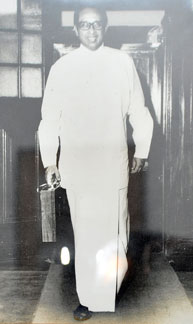 |
|
Carrying the budget valise |
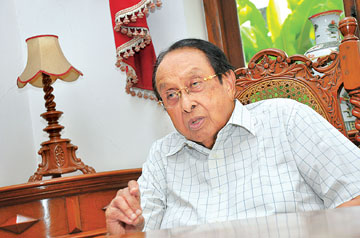 |
| |
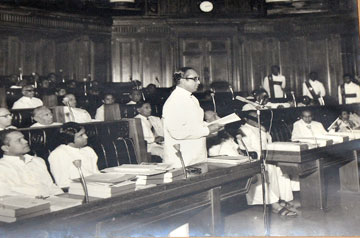 |
| Making the
maiden budget speech of the 1977 UNP Government |
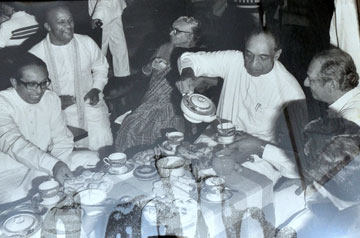 |
| At the
post-budget tea party, with his mother Mrs. R.J. de Mel seated
between Appapillai Amirthalingam and President J.R. Jayewardene |
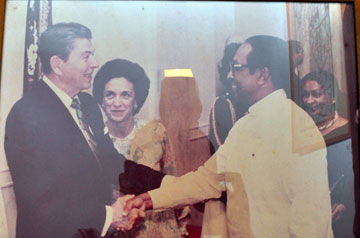 |
| Greeting the
then US President Ronald Reagan and Nancy Reagan |
And Ronnie de Mel started his University education at the University
of Ceylon. "It was an exhilarating experience, he said, recollecting the
bombing near his school, S. Thomas' College, Mount Lavinia and at
Ratmalana. When the army returned fire the Japanese aircraft which was
hit came down on the school grounds.
All the schools were closed and people moved out of Colombo," he
said. S. Thomas' College was relocated in Kandy and Guruthalawa during
this period and de Mel studied in Kandy for two months before coming to
Colombo to start university education.
The university, which later became University of Colombo, was
changing from the British syllabus to a local one and de Mel enrolled to
study Intermediate in Arts; English, Latin, Greek and History in which
he majored.
"We ragged the juniors but there was no violence. We had university
elections without any violence as well," de Mel reminisced his time as
the President of the Students' Union where he was able to act on his
pro-socialist sentiments.
He completed his honours degree and became All Ceylon first in order
and was awarded another scholarship to Oxford or Cambridge to study
Arts, but "again it had to be a troopship, so that put an end to it."
Civil Service
Leaving the UK dream aside, de Mel joined the Civil Service, and
after a two year training period out of Colombo, joined the Ministry of
Agriculture and Lands as Assistant Secretary in 1950 when Dudley
Senanayake was the Minister and later at the Ministry of Agriculture and
Food.
"I was always a politician at heart," he said. As a member of the
Civil Service, he was not allowed to engage in politics in the open. But
the party leaders were aware of his involvement so much so that in 1956
both S.W.R.D. Bandaranaike and Dudley Senanayake invited him to contest
in the elections.
Though inclined more towards leftist politics, he declined both
offers. It would have been the first time to engage in party politics
but he was still ready to spend a few more years with the Civil Service
which was the cream of the local academia.
Early political life
Enlisted in politics, in 1967, de Mel became the sitting member of
Parliament for the Dondra seat. Sirimavo Bandaranaike invited him to
contest in the election which, according to de Mel, was the toughest
election he could have thought of in the history of elections.
By the time he was asked to contest, he had been to Dondra only
twice, to visit the historical temple in the area. He hardly knew
anybody, earning the term 'Parachute Man' as the Opposition called him.
"But it was a well-organised election and I won the seat", probably
for the first time in Sri Lanka that a person won a parliamentary seat
without knowing anybody in the constituency before the nomination day,
he added.
De Mel's success as a key speaker in the opposition was instant.
"There were very interesting debates in Parliament those days and
debating was at a very high level," he recollected.
Unlike today, debates continued for about three days and whoever
willing could speak. On one such occasion, he was called upon to speak
for the Opposition around 8.00 p.m. and was asked to hold the fort till
following morning without a break, till the others came.
"I did it and enjoyed every moment of it. I had a lot of tea and
water to help me during the debate and a fair number of members
listening to what I had to say." To him, the old Parliament was the best
place to be, amidst great politicians, wonderful speakers, even if that
meant spending a whole night speaking.
In 1970, Sirimavo Bandaranaike came into power with a two-third's
majority and UNP, the main opposition, was reduced to only seven seats.
"But I got completely disillusioned," firstly with the way the SLFP ran
the country with a two third majority and secondly, because he "was
completely overlooked when the new Cabinet portfolios were allocated."
One day, the then UNP leader J.R. Jayewardene and his wife visited de
Mels at their house for dinner after which he and Jayewardene had a
lengthy 'chat' about the political situation in the country.
And then came the invitation for him to join the UNP. "My wife jumped
up at the idea because her father had been a member of the UNP till his
death. So I told him that I will consider his offer after speaking to my
constituency."
People in Dondra who were disappointed that their MP was left out of
the Cabinet, welcomed the proposal to join the UNP and Ronnie de Mel
accepted the offer to join UNP at a time the party had no 'hope in hell'
to come back to power.
"I did so at the very next sitting in Parliament in 1973, making, in
my opinion, one of the best speeches I ever made in Parliament."
He said this led to the most glorious period in his political career,
holding meetings all over the country and carrying out a 'wonderful
political campaign' to bring down one of the most powerful governments
established in Sri Lanka, against the strongest odds.
Longest stint
Although he never studied economics as a subject, it has always been
a field that interested him; enough to make him subscribe to
international journals on economics. That made his life easy as the
Minister for Finance.
He admits to delivering long budget speeches, prepared by himself.
The speech would normally start at 2 p.m., and would break for an hour
for tea at 4.00 p.m.
"This tea-break was not confined to MPs. They were happy gatherings
of MPs, diplomats and even family members of MPs," he recalled.
The budget speech, de Mel said, would resume at 5.00 p.m. and finish
at 6.00 p.m., and one fine day it continued till 8.30 p.m., marking it
as the longest budget speech; but the audience was very interactive and
important questions were asked during the budget, he said, making a
comparison to the present parliament sessions.
Even though presidents such as Chandrika Kumaratunga and Mahinda
Rajapaksa held the Ministry of Finance portfolios for nearly 10 years,
de Mel's record of 11 years remains still unbeaten.
Socialism to capitalism
President Jayewardene had always been an ardent supporter of the free
economy and after the 'fiasco' of the economic policies of the SLFP
government from 1970-77, de Mel said that he too gradually converted to
the idea that a free economy would be best for Sri Lanka.
He made this conversion personally while the country underwent the
conversion economically. "I must be the first in the world to make such
a conversion personally and introduced free economy to a country".
Today, every country, including Russia and China, is fast embracing
the open economy system. "I believed in the idea that a country could be
developed under socialism till I visited the socialist countries back
then. That's when I realised we need support if we are to develop as a
country." Following countless meetings with President Jayewardene, de
Mel came up with a modified version of the open economy with many
socialist features to support the poor.
"I was careful not to touch free education, free health, concessions
for agriculture, fisheries and various other sectors. On the other hand,
we introduced tourism to Sri Lanka, as well as Free Trade Zones and
massive projects such as the Mahaveli scheme which built Victoria,
Rantembe and other dams", he said with pride.
The foundation to the open economy was laid during the very first
budget speech of the 1977 government and de Mel was faced with a great
deal of opposition.
"It had become fashionable to follow a strictly socialist path back
then", he said. People and newspapers were nonplussed and even confused
and many opposed it without realising the true measure of it on a
developing country like Sri Lanka.
However, he appreciated the full cooperation given to him by his UNP
colleagues in parliament. Now, he said, everybody accepts the successful
outcome of those monumental changes.
Ronnie de Mel keeps himself occupied, as always. "I have a few close
friends whom I visit, or they visit me," and he reads, and keeps a tab
on the current situation in the country. |

